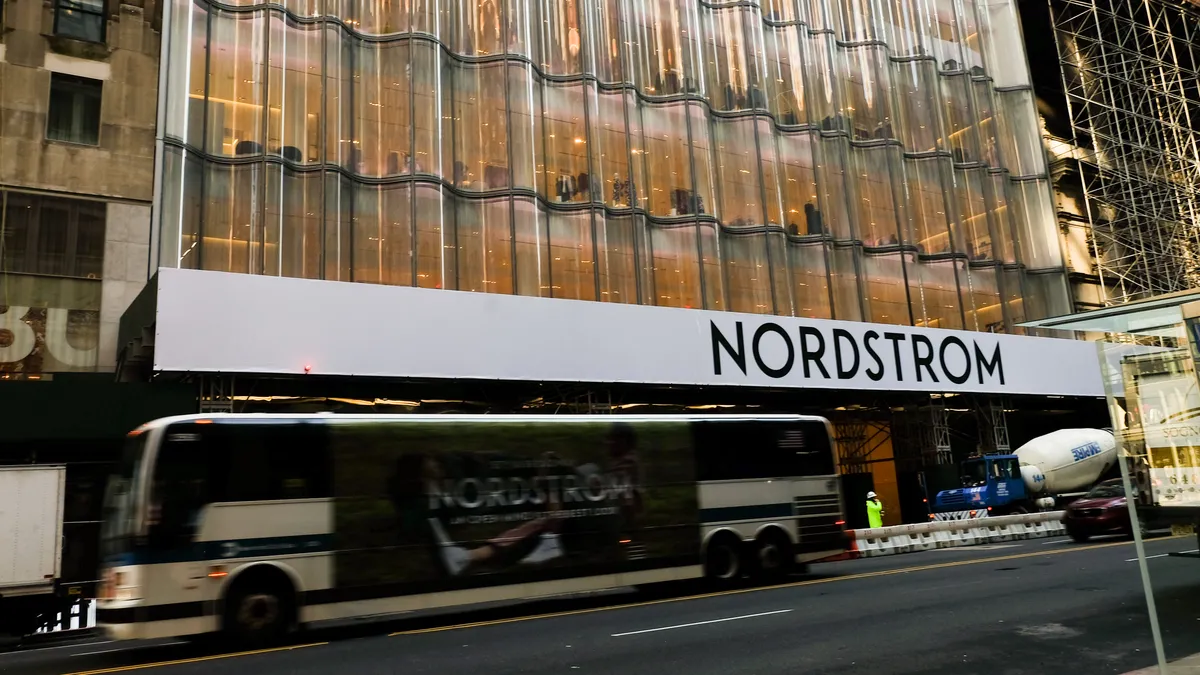UPDATE: July 10, 2020: In a statement to Retail Dive last week, a Nordstrom spokesperson declined to answer specific questions about the letter from Jamie Nordstrom, but acknowledged that its pandemic-related cost cuts involve pushing back against lease obligations. "As part of our continued efforts to navigate this situation and achieve the expense reductions announced previously, we are modifying our rent payments until January 2021, at which point we'll fully reconcile our payments," the spokesperson said in an email. "We're working closely with our store landlords to find a mutually agreeable path forward."
Dive Brief:
-
Nordstrom June 3 notified landlords of its full-line and off-price Rack stores that it will pay only half the occupancy costs for the remainder of the year, according to a letter from President of Stores Jamie Nordstrom to property owners, which was obtained by Retail Dive. A Nordstrom spokesperson didn't immediately respond to Retail Dive's request for more information or comment.
-
In the letter, the company also said it will use store comps as the basis for any "true up rent payment, up to a full reconciliation should 2020 sales reach 90% of sales made in that location in 2019." The department store said it "will continue to maintain insurance coverage, pay utilities on which we are the account holder, and maintain your building(s) as required by the lease."
-
Separately, Nordstrom on Wednesday confirmed that it's "realigning and reducing our workforce to support our market strategy, including in our corporate support teams." The layoffs are part of a 20% reduction "to non-occupancy related overhead expenses," a spokesperson told Retail Dive in an email, but declined to say how many people are affected. Sourcing Journal last week, citing unnamed sources, said plans are to cut up to 25% of its workforce. Those don't include layoffs at the 16 stores slated for permanent closure, according to that report. In 2019, the retailer employed about 68,000 full- or part-time employees.
Dive Insight:
Even as stores reopen in most areas, retailers are scrambling to hold onto as much cash as possible, in order to run a business that is entertaining precious few customers in the middle of a pandemic.
While Nordstrom executives in remarks to analysts in May expressed confidence in their overall strategy, which is to knit together the company's full-price, off-price and Local stores into one retail ecosystem, the pandemic and its economic fallout have interfered with that. The department store in May said first quarter net sales fell 40% year over year, with full-line sales down 36% and off-price sales down 45%. The retailer experienced loss before interest and taxes of $813 million, from EBIT of $77 million a year ago, and swung to a net loss of $521 million, including after-tax COVID-19 charges of $173 million, from net earnings of $37 million a year ago.
"COVID-19 has had a very real impact on Nordstrom, accelerating the importance of our market strategy and capabilities we've invested in for years," the Nordstrom spokesperson said Wednesday, noting the company's recent permanent store closures and executive salary cuts. "Our new operating model helps us serve customers across our business as one company, while enabling us to be more agile and flexible. We'll continue to invest in critical capabilities across technology, data analytics and supply chain to deliver for our customers."
But with its outreach to landlords, the company is flirting with litigation, warns Nick Egelanian, president of retail real estate firm SiteWorks. Simon Property Group, Brookfield and others in recent weeks have gone to court to force rents out of their retail tenants. Nordstrom's letter was sent out en masse "apparently with no forewarning or prior discussion," Egelanian said.
Along with ominous signs of the depth of Nordstrom's struggles — including the pullback of its fleet and under-merchandising in some locations that Egelanian said has been part of an effort to cut costs and stem losses at those stores — the letter was an inelegant attempt at negotiation, he said.
"Many landlords, apparently unimpressed with the company's slipshod approach to rent reduction and generally less enamored with a company once considered the gold standard in service and apparel retailing, are opposing Nordstrom's action vigorously," he told Retail Dive in an email. In addition to possibly heading to court with its landlords, Nordstrom "has become the subject of wide-spread speculation that it could end up in Chapter 11 bankruptcy reorganization before the story of the pandemic is fully written."
















